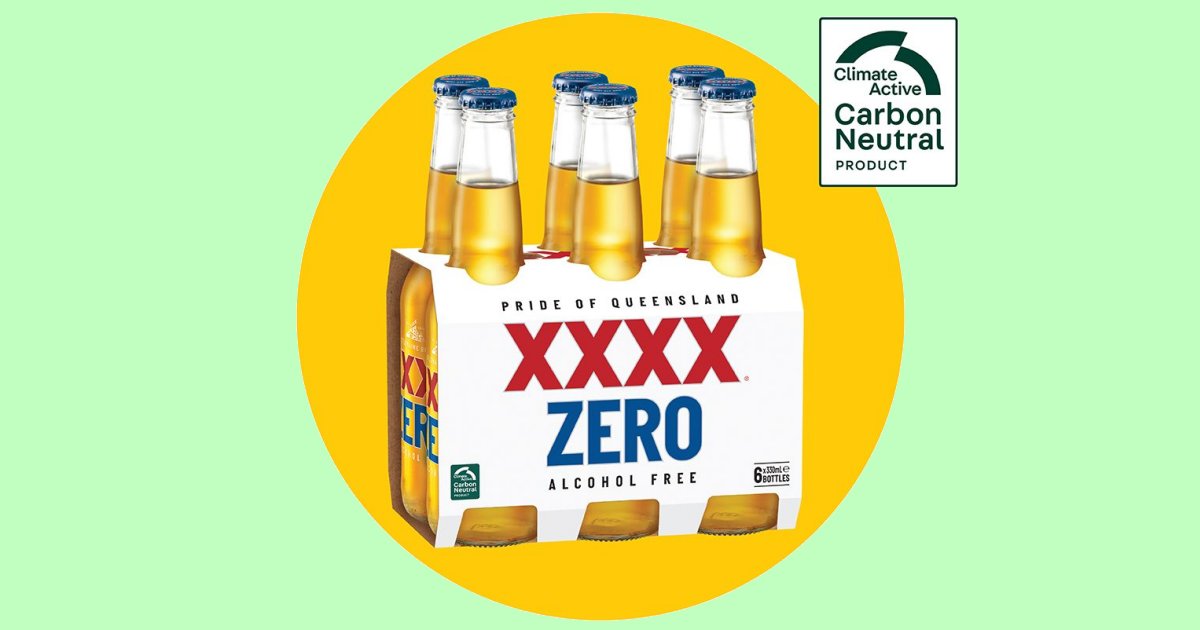
Australians with a taste for non-alcoholic beer now have another choice, and this one has been certified as carbon neutral – Fourex Zero.
Once upon a time the idea of drinking non-alcoholic beer would have sent shivers up my spine and had me labelling the practice as “un-Australian”. But after a far too long and somewhat devastating drinking career, I finally realised I was silly enough without alcohol added and would never get the hang of responsible drinking.
But I missed the taste of beer.
After 7 years without a drop passing my lips, I gave one of these featherweight brews a whirl and to my surprise didn’t hurl my stomach contents or the stubby. The taste was pretty good – and it was great to have a beer and remember what happened afterwards.
Since then, other brands have jumped onto the non-alcoholic beer bandwagon. Australian tee-totallers and those just wanting a change from time to time for whatever reason are more spoiled for choice these days.
One of the newest brews on the market is Fourex Zero.
Perhaps you’re wondering why I’m spelling the product name how it’s pronounced rather than the way it is spelled. The last time I spelled it correctly in an article, it generated a lot of interest in a certain country from certain people looking something entirely different. Tens of thousands of people viewed that article in the first 24 hours, but most of them were looking for …other stuff. It seems they spell it with four x’s over there rather than three and I had to make a bunch of changes to the brand name in the article to get those folks to buzz off.
Yet, I digress.
Described as a full flavoured, easy drinking, alcohol-free lager, Fourex Zero has been crafted to represent the very best of the modern Aussie lifestyle; whatever that may be.
The tipple has been certified carbon neutral with 100% Australian Carbon Credit Units (ACCUs)1, supporting local offset projects – this one a “human-induced regeneration project in Queensland” according to the Climate Active profile page.
I haven’t tried the brew yet, but it will be on my to-check-out list when I buy my single six-pack of zero-alcohol beer a year in 7 months’ time. I still have 5 stubbies from my last purchase in December, so unfortunately the company still won’t be seeing anywhere the amount of cash from me it once did; particularly when there was a major beer strike some decades ago and my go-to Victorian brand wasn’t available.
Fourex And Sustainability
Global beverage company and Fourex owner Lion has been busy working on the sustainability street cred of the brand over the past few years.
“Climate change poses an urgent threat to us all – including the beer we love to drink,” states the company. “That’s why we’re investing in climate solutions to reduce our footprint.”
Well, there’s that and a growing number of Australians who are concerned about the impacts of climate change and how companies are responding to the threat. It’s simply good business.
The firm is buying Australian carbon offsets to address Fourex emissions in the short term, while energy efficiency investments enable Lion to make direct emission reductions from its operations in the long term.
One of those investments is in solar power. Back in 2019, Lion showed off a $2 million, 690-kilowatt PV system boasting 2,200 solar panels. The system was expected to generate 1.368 gigawatt-hours of clean electricity each year.
Through solar energy, offsets and using biogas generated by the brewing process, the Castlemaine Perkins brewery in the Brisbane suburb of Milton has been carbon neutral since 2020. Lion says it is committed to using 100% renewable electricity to brew Fourex beer by 2025, and is aiming for a net-zero value chain by 2050.
In terms of other sustainability measures, these include the installation of a reverse osmosis water recycling plant at the brewery2, the elimination of shrink wrap from packaging by 2023 and a target of 100% recyclable packaging by 2025.
Footnotes
- ACCUs received a bit of bad press recently, but we’re assured they are dinky-di and true-blue ↩
- But before someone quips it explains the taste, the recycled waste water is used in cooling towers, boilers and for cleaning. ↩

 RSS - Posts
RSS - Posts



Speak Your Mind